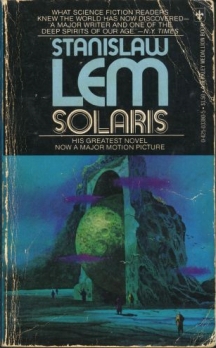We don't want to conquer the cosmos, we simply want to extend the boundaries of Earth to the frontiers of the cosmos. For us, such and such a planet is as arid as the Sahara, another as frozen as the North Pole, yet another as lush as the Amazon basin. We are humanitarian and chivalrous; we don't want to enslave other races, we simply want to bequeath them our values and take over their heritage in exchange. We think of ourselves as the Knights of the Holy Contact. This is another lie. We are only seeking Man. We have no need of other worlds. We need mirrors.
Kris Kelvin arrives at a base orbiting the planet Solaris, home of the living ocean, excited to study the strange life form--if it is that--that has captivated not just his imagination but all of mankind's. When he arrives, he finds the station in shambles, his contact dead by his own hand, and two other scientists having descended into degrees of insanity. He's told to be wary; there are strange visitors on the station. And sure enough, the first night he's there, he's visited by an old girlfriend who committed suicide many years ago--a kind of Ghost of Girlfriends Past.
I never saw the famous Tarkovsky film, but I did see the (surprisingly good) George Clooney remake. My recollection of the film was that the appearance of Clooney's old girlfriend (Vera Farmiga?) was a mystery. But in the book, the mystery is tempered by the fact that Solaris has been throwing up strange mysteries for a hundred years. The planet is covered in ocean, but the ocean exhibits a kind of intelligence, perhaps even sentience. The liquid shifts, changes, in purposeful ways; it even hardens into facsimiles of the human objects it "sees." Some say it present models of places and people in their memories, but what happens to Kelvin and the others on the station has never happened before.
Solaris is best when it's diving into the knotty question of whether the ocean-planet is sentient, or even alive. One school, to which Kelvin belongs, thinks the ultimate goal of Solaristics is contact--to talk to the planet in some meaningful way. But the major theme of Solaris is the way that our narcissism shadows even our high-minded scientific work. We can only conceive of extrasolar life that reflects ourselves in some way, but when it comes, if it comes, it will probably be so foreign to us that we won't be able to fit it into our solipsistic categories of "life." Is the ocean alive? That's not a scientific question, Lem says, it's an introspective one. What do we see in ourselves that we think is living?
The manifestation of Kelvin's ex, Rheya, could be Solaris making a kind of contact of its own--witnessing something in Kelvin's pysche that it reproduces as a kind of recognition. The depiction of Rheya--mysterious, fragile, shadowy--seemed to me to come from the women-sure-are-mysterious genre of masculine writing. It makes sense, I guess, if Rheya is a kind of manifestation of Kelvin's own inner thoughts, rather than a real flesh-and-blood person. But something about the way that the mystery of women became a stand-in for the mystery of Solaris made me wary of the book as a whole. Still, it's another piece of evidence that shows just how underrated Lem is here in America.


No comments:
Post a Comment